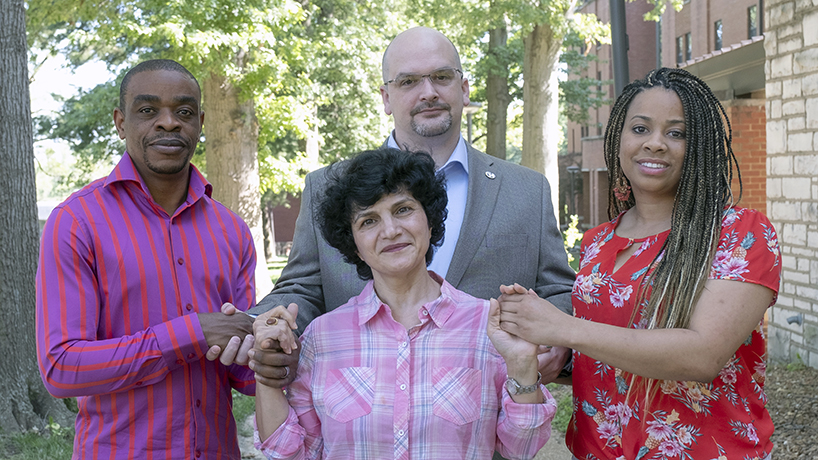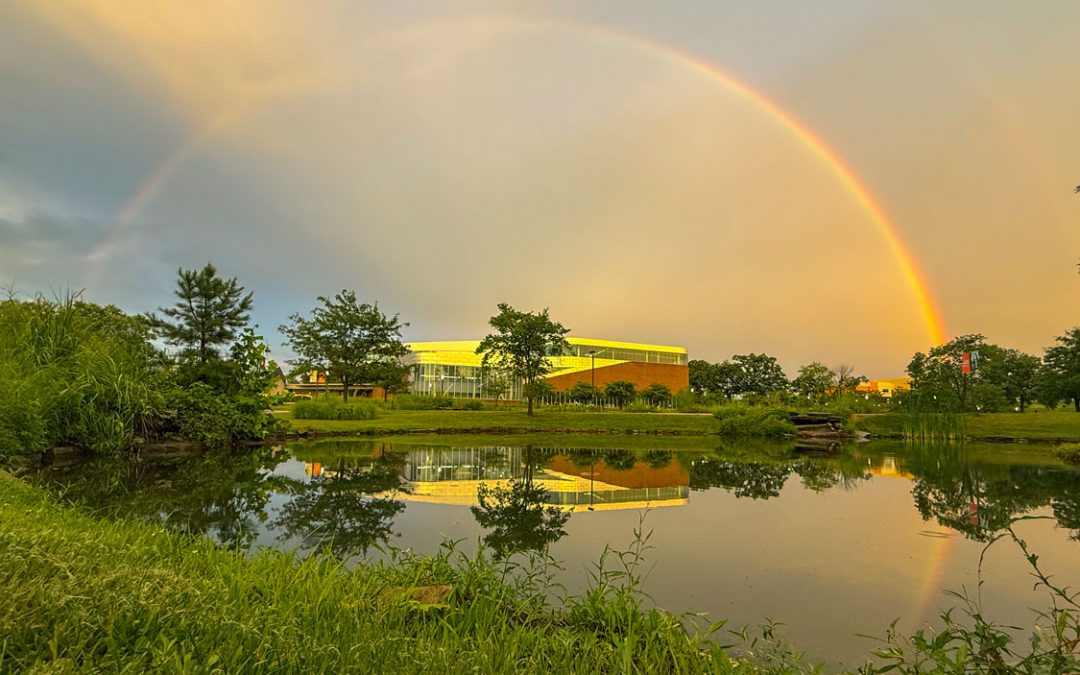
Clockwise from left: Bankole Aluko, Dale Mathis, Leighia McGhee and Fatemah Choupani are the 2018-20 UMSL Jonas Scholars cohort. (Photo by August Jennewein)
Health care approaches that work for the general population don’t necessarily translate to veterans.
Take, for example, congestive heart failure, explained Dale Mathis, a University of Missouri–St. Louis nursing student and U.S. Army veteran. Doctors generally have patients weigh themselves daily to watch for sudden gain, which indicates fluid retention that in turn signals heart failure.
But many veterans don’t care about 2 to 5 pounds, he said. Tell them to come in when they are having breathing or walking problems, when they feel limited.
“People understand things differently,” he said. “If you can understand how they are thinking, then you can set up systems to get around those limiting behaviors. You have to meet people where they are if you want them to do what you need them to do.”
Mathis believes that specialized approach is critical for working in veterans’ health care. The Jonas Philanthropies agrees.
That’s partially why, in 2008, the foundation established the Jonas Nurse Scholars, an initiative to help foster doctoral nursing leaders: researchers, nursing faculty, clinicians and others.
The selected scholars are focused on the nation’s “most pressing health care needs” such as chronic health, psychiatric-mental health, environmental health and more. Certain recipients, who are dedicated to veterans’ health, are designated Veterans’ Healthcare Scholars.
For its 2018-20 cohort, the philanthropies selected four UMSL College of Nursing students: Jonas Veterans Healthcare Scholars Mathis and Bankole Aluko and Jonas Scholars Leighia McGhee and Fatemah Choupani.
Since the initiative was first established, it has awarded $25 million in scholarship funds to more than 1,250 students across the nation. Each scholar receives a $5,000 annual scholarship for two years, which the College of Nursing matches. The foundation provides both financial support and networking and leadership development, which hits its annual apex in the fall at the Scholars Conference in Washington, D.C.
Developing strategies to keep veterans healthy
Once people leave the military, they often stop going to the doctor, stop taking care of themselves.
“We end up with multiple morbidities over time,” Mathis said. “Not everybody, but as a population, it’s very evident that veterans go from a super active lifestyle to not so much. It has detrimental effects, and between that and self-isolating behaviors, it’s bad. I want to at least try to alleviate some of that.”
Which is the long way of saying that Mathis, a former U.S. Army combat medic and now-staff nurse, is interested in researching how to keep veterans healthy long term and out of the hospital.
In service of that goal, he’s three years into UMSL’s nurse PhD program after graduating from UMSL in 2016 with his BSN and minors in philosophy and psychology.
When Mathis started his current program, he’d figured he’d just take some classes part time and see where things went. That changed when he became a Jonas Scholar.
“I was happy, shocked,” he said. “It became real very fast, and the amount of the effort that is put into this scholarship is life-changing given the amount of debt it helps prevent.”
Becoming a change agent
Building connections and community – that’s a large part of appeal of the Jonas Scholars for McGhee.
That network is how the DNP candidate found her preceptor, College of Nursing PhD alumna Brandie Stiles.
“I’d been hearing about her for a couple months, how intelligent she is,” McGhee said, explaining that their shared Jonas Scholar status helped her reach out. “Knowing I had a connection was great. I guess that means I’ll eventually be one of these great people that others will want to have connections with. That sounds weird, but it’s nice to have the community, to be able to help people and have people help you.”
McGhee is already helping others as a nurse on the inpatient psychiatry floor, where she sees the need for a different kind of provider and also simply for more clinicians. With many doctors retiring and fewer going into psychiatry, there’s an ever-growing gap.
“I think it’s a place where nurse practitioners can serve a role to provide quality healthcare, and it’s a place where there are probably going to be a lot of empty holes,” McGhee said. “In order to diagnose mental illness, you are looking for anomalies in peoples’ cognition – in what they think and what they say and how they view life. Some of that is cultural. If you don’t have an understanding of cultural differences, you may be misdiagnosing peoples’ cultural beliefs for delusions.”
Seeing patients on the other side of their acute conditions is gratifying for McGhee. With her DNP clinical project, she’s hoping to make that transition smoother for patients with tardive dyskinesia, a movement disorder that can result from long-term use of psychiatric drugs.
The first-line drug of choice is Cogentin. Though recent research shows that it can actually cause the disorder long term, prescribers don’t have new guidelines to rely on. That’s what McGhee hopes to develop.
“There’s recommendations if you do have an acute side effect to treat for a week or two then wean the patient back off it, but that’s not what’s really happening,” she said. “There can be danger in prescribing a medication long term, but we’re not really working on getting people off of it very well right now.”
Serving the underserved
Bankole Aluko understands the importance of being sensitive to patients’ cultures.
That’s partly because he immigrated from Nigeria in 2008, but it’s mostly because of what he’s learned as a College of Nursing DNP candidate and a Jonas Scholar.
“I’ve learned how to have a listening ear and how to have good communication,” he said. “You have to understand people. You have to involve them in decision-making. You don’t just give an order to do this. You have to buy their views, their opinions, their ideas together and then you can be a good leader.”
Aluko first came to UMSL as an undergraduate in the UMSL/WUSTL Joint Undergraduate Engineering Program but switched to nursing after a year and graduated with his BSN in 2014. The ease and practicality of the three-year BSN-to-DNP program sold him on continuing his education.
Aluko has found both programs to be an excellent fit.
“I love it here,” he said. “UMSL, to me, is the best school in the country when you look at what it’s doing. We have students coming to our program from all over the world.”
Having benefited from scholarships during his undergraduate program, Aluko wanted to give back. He enlisted in the U.S. Navy Reserve a little more than a year ago and now serves as an officer.
In addition to serving his adoptive country, Aluko hopes to help with his DNP degree. He’s just begun working on his clinical scholarship project, which he’d like to be on the applications of intravenous vitamin C for cancer patients.
Eventually, he’d like to open his own nurse practitioner practice in a rural area.
“There are a lot of patients in rural areas,” he said. “Physicians are busy with patients in the urban areas. We, the DNP providers, are ready to provide care to residents living in the rural areas, and if I have my own practice, people will be able to get help. I’d like to go there and see them and make them whole again.”
Researching to benefit humanity
Getting her PhD so she could become a researcher was a long-held dream for Choupani.
She’d wanted to continue her schooling after earning her BSN degree in 1997, but decided encouraging her children to follow their dreams came first. That determination held as her son became a computer engineer and as Choupani immigrated to the U.S. from Iran in September 2011, accompanying her daughter to a master’s degree at the University of California, Irvine.
After seeing her daughter through that program and into a PhD in aerospace at the University of Washington in Seattle, Choupani started applying to schools herself.
That’s how in 2016 she found herself moving to St. Louis to start her nursing PhD at UMSL.
A nurse with 15 years of experience even before moving to the U.S., Choupani has some well-established research interests and projects such as nutrition education for underserved peoples, breast cancer prevention and research, preventing diabetes rehospitalization and prevention of heart disease through healthy eating and exercise.
“I feel several of the professors like Dr. Kuei Hsueh, Dr. Wilma Calvert and Dr. Natalie Murphy who were very generous to my interest area,” she said. “My interest area dates back to my bachelor’s degree where I developed a passion for behavioral intervention for self management of health, improving quality of life as well as improving patients’ outcomes.”
Another one of Choupani’s interests dating back to her time as an undergraduate is genetics and epigenetics. She’s hoping to work with Calvert for her dissertation on the interaction of genetics and epigenetics and obesity in disadvantaged populations.
She’d like to eventually become a professor and sees the Jonas Scholarship as key for future success. As an immigrant with most of her work experience in another country, she feels having this opportunity will help her find a job after school. She’s already taking advantage of the networking opportunities to find other Scholars researching similar areas.
“I was very surprised and very happy when I found out,” Choupani said. “It’s really an honor.”














